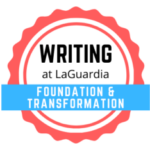-

Using Comparison to Support Analysis in ENA 101 by Christopher Schmidt
Image Credit: Markus Spiske, Unsplash This lesson teaches students to use definition and comparison to support basic analysis. In small groups, students perform a pre-writing activity using a chart with definitions. Working individually, they will then write sentences structured by the comparison developed in the chart. Students are meant to emerge with an understanding of…
|
-

Developing Thesis Statements, Topic Sentences, and Ideas for ENG 101 by Lalit Bajaj
To the Instructor: The goal of this exercise is to help students develop thesis statements, topic sentences, and ideas that belong in their respective paragraphs. I developed this idea after reading the text, Writing in College: From Competence to Excellence, found here, as part of O.E.R. In this exercise, students will read chapter 3, “Constructing…
|
-

Devising Research Questions / Using Questions to Derive Topics and Statements of Argument for ENG 101 by Kelly I. Aliano
This is a LOW-STAKES ACTIVITY. The follow-up activity, which asks students to take their answers to the questionnaire and submit it as a final paper proposal, is a high-stakes activity. Review “Asking Questions” in College Writing https://www.oercommons.org/courses/collegewriting/view Put the question frames (who, what, when, where, why, and how) on the board Have students engage in…
|
-

ENG 103 Sources Activity by Kelly I. Aliano
This activity took place over three weeks of our course, from Week Six through Week Eight. Learning Objectives: Practice using the internet to find sources Practice using the library databases to find sources Learn how to evaluate sources based on quality and relevance Begin developing citation skills PART I: Asynchronous Research Activity Read ALL entries…
|
-

Integrated Reading and Writing Assignment Sequence for ENG/A 101 by Dominique Zino
Course theme: “Literacies of Power” From Deborah Brandt’s article “Sponsors of Literacy” CCC 49.2 (May 1998): “Sponsors, as I have come to think of them, are any agents, local or distant, concrete or abstract, who enable, support, teach, model, as well as recruit, regulate, suppress, or withhold literacy—and gain advantage by it in some way.…
|






